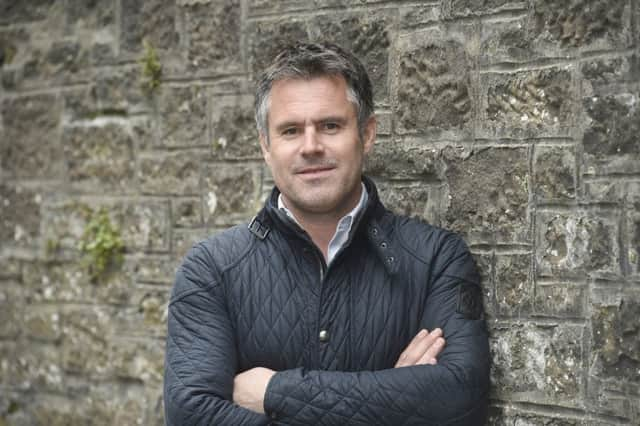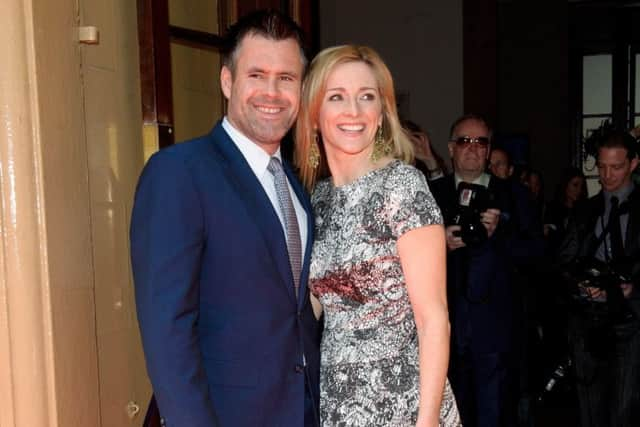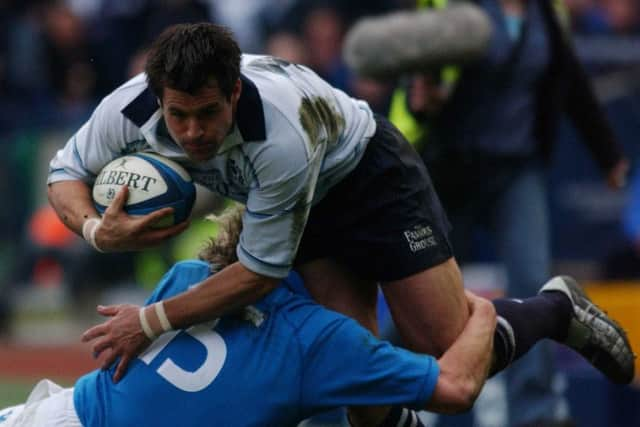Kenny Logan takes bold STEP to help children with dyslexia


Having just turned 20, the winger from Manor Powis in Stirlingshire was one of the brightest prospects in the game. While other players focused on their match preparation, Logan was more concerned his lack of reading ability could be exposed. Diagnosed with dyslexia at 16, he struggled with the kinds of everyday tasks others didn’t stop to think about.
Sitting in a Dunblane cafe, Logan, now 44, is candid as he reflects on the summer of 1992. “I wasn’t worried about playing – I was worried about being handed a song sheet and being told to learn it,” he says. “We used to learn a song on every Scotland tour.”
Advertisement
Hide AdAdvertisement
Hide AdBut Logan was in trouble before he even had time to disembark.


“We landed in Australia and everyone’s feeling great. Then a steward went through the cabin handing out immigration forms for all the passengers to fill in. I went into panic mode. I’m thinking: how do I get out of this?
“I was sitting next to Doddie Weir. I asked to see his form so I could copy it. I handed it to the steward and he said: ‘Mate. You’re not Doddie Weir’. I had copied it word for word.
“I slunk to the back of the queue. Only Gavin Hastings, then the vice-captain, was behind me. He’s telling me to hurry up. But then the steward took the form and filled it in for me. Maybe he could see the fear in my eyes. It was the most daunting experience of the whole trip. My first cap was easy compared to that.”


Rugby, and sport in general, was Logan’s release when growing up. School was a struggle. As a young boy, he couldn’t understand why reading and writing seemed beyond him when others found it so easy.
“My self-esteem was low when I was at school,” he explains. I was considered “thick”. It wasn’t the teachers’ fault – it was the system, in the sense that no one knew what was wrong with me.
“I used to blame the teachers. I don’t blame them now. When I was told I was dyslexic I genuinely thought I could take medication and it would clear up within 10 days.”
Logan, who went on to win 70 caps for Scotland, did not speak publicly about his dyslexia until he was 30. Even then, he admits he only spoke out as he “had backed himself into a corner”.


Advertisement
Hide AdAdvertisement
Hide Ad“My dad didn’t know – he died when I was 19 – and my mum was definitely avoiding the situation,” he adds. “She’s proud of me but she’s never discussed it.
“My coaches and teammates didn’t know. I used to deliberately turn up late to team meetings so I wouldn’t be asked to take notes. [Scotland coach] Jim Telfer used to go mental. I used to photocopy game plans from others. I was told to stop losing my notes – but if I could have written them in the first place, I wouldn’t have lost them.
“I couldn’t read the team notes so I would study diagrams. Then I would run a move and the coach would ask me what I was doing. Then I had another coping method – I would ask a teammate to run the move for me so I could watch them.”
But his decision to finally do something about it transformed his life. With support from his wife Gabby, he began to undertake simple balance and eye-coordination exercises in a bid to boost his cognitive performance.


As his reading and writing slowly improved, he noticed his performance on the pitch was becoming more consistent. “I was beginning to see the game in a different way. I was able to focus.” At the 2003 Rugby World Cup, his last major tournament as a Scotland player, Logan decided he had to do something to help children, who like him, had struggled at school through no fault of their own.
“I haven’t told many people this,” he says. “When I was nearing the end of my Scotland career, I wrote down five or six life goals in a little black book. One was to be a good person, and one was to help kids in Scotland. I put ‘rugby?’ next to it, but I didn’t know what it would be for. I wanted to find a way to achieve that.”
Logan is now promoting the STEP programme, which uses physical literacy to help improve academic attainment and well-being among pupils.
Physical literacy is best described as the mastering of fundamental movement skills. As lifestyles become more sedentary, and parents no longer allow children to play outdoors unsupervised, advocates of physical literacy believe repetitive games involving throwing and catching – such as those in the STEP programme – can embed in youngsters skills such as balance and risk-taking and generally improve their well-being.
Advertisement
Hide AdAdvertisement
Hide AdAimed at children aged from seven-13, each participant undertakes two 10 minute individual sessions – one in the morning, one in the afternoon – with the results being monitored and tailored to fit each child.
Simple repetitive exercises are designed to “embed core physical functions” and improve a child’s concentration, leading to better results in the classroom.
Logan has met education secretary John Swinney and hopes to see the STEP programme rolled out across Scotland in a bid to close the attainment gap.
He was convinced of the programme’s success after seeing the difference it made to his son Reuben, who has mild dyspraxia – a condition affecting mental and physical co-ordination.
“My son was struggling, which was another motivation for me wanting to get involved,” he says. “He was eight when he started the programme. He’s now 11 and there’s been a massive improvement. He’s now got a sport scholarship. His hand to eye coordination has improved and the change in his behaviour has been unbelievable. I used to collect him at school and a teacher would say: ‘Can I have a word Mr Logan?’
“He probably needs a bit more time in his exams. He’s still got to work hard, but he’s in a good place. We’re both thrilled.”
The programme is already used in a few independent schools in England and was officially launched north of the Border in November. Meetings with local authorities are now being arranged. In an era when headteachers could be handed more responsibility for budgets, Logan is convinced this is a potential way forward for struggling pupils.
“I got huge benefit from doing similar exercises. I want kids to be brave and do something that helps them and doesn’t feel like learning,” he says.
Advertisement
Hide AdAdvertisement
Hide Ad“John Swinney has been amazingly supportive. He has asked us to meet with local authorities, to see how it can fit with their school improvement plan in relation to raising attainment.”
Reuben is shining on the rugby pitch as well as in the classroom. Could we see another Logan don the famous dark blue shirt of Scotland in the future?
“He wants to be a professional rugby player,” he says, grinning. “He’s talented, but he’s too young to think about that just yet. He plays on the left wing, funnily enough. He’s realised he doesn’t like the right wing as kids don’t pass from left to right. That’s exactly what I did.
“He’s a Scotland fan. We’ve had a bit of a kicking in recent years, but the Six Nations this year has been nice.”